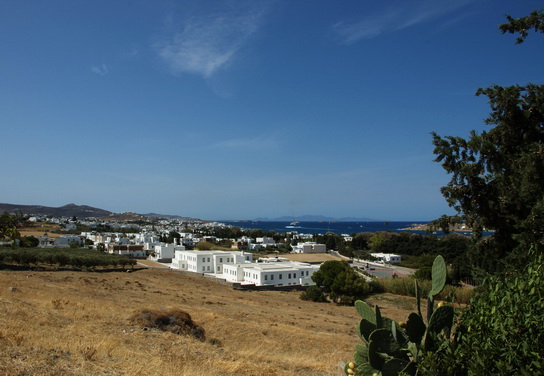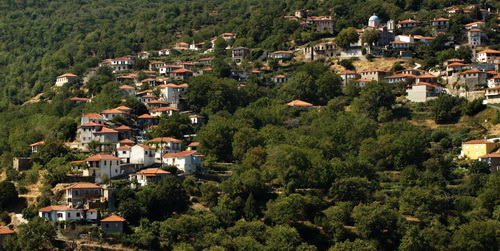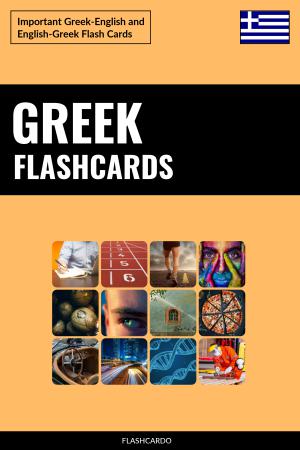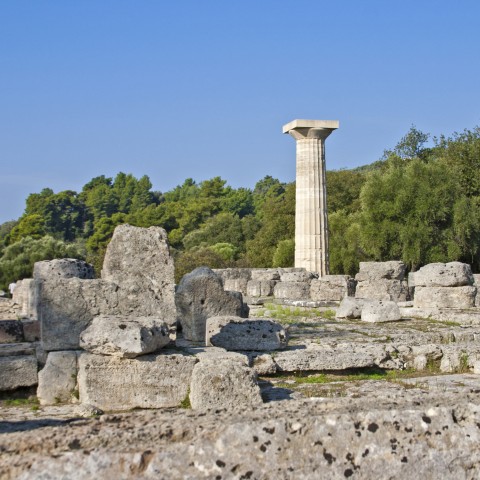Question words are placed at the beginning of the sentence. Sometimes their use is confusing because some of them are declined, i.e. they have singular and plural, genders and cases. Note that we use the Greek question mark: ;
1. Ποιος, ποια, ποιο (pios, pia, pio): who, which
Ποιος είναι αυτός ο άντρας; (pios ine aftos o andras) Who is this man?
Ποια είναι η αδερφή σου; (pia ine i aderfi sou) Who is your sister?
Ποιο είναι το ποτήρι σου; (pio ine to potiri sou) Which one is your glass?
2. Ποιον, ποια, ποιο (pion, pia, pio): whom, which
Με ποιούς πήγες σινεμά; (me pious piges sinema) With whom did he go to the movies?
3. Πού (pou): where
Πού είναι η παραλία; (pou ine i paralia) Where’s the beach?
4. Πότε (pote): when
Πότε θα πας στους συγγενείς σου; (pote tha pas stous sigenis sou) When will you visit your relatives?
5. Πώς (pos): how
Πώς ήρθες; (pos irthes) How did you get here?
6.Τίνος (tinos): whose
Τίνος είναι αυτά τα χρήματα; (tinos ine afta ta hrimata) Whose is this money?
In oral speech we use:
Ποιανού, ποιανής, ποιανού (pianou, pianis, pianou)
Ποιανής είναι αυτή η φούστα; (pianis ine afti I fousta) Whose is this skirt?
Ποιανού είναι αυτό το αυτοκίνητο; (pianou ine afto to aftokinito) Whose is this car?
7. Τι (ti): what
Τι θέλεις να πιεις; (ti thelis na piis) What would you like to drink?
8. Γιατί (yati):why
Γιατί δεν έρχεσαι μαζί μας; (yati den erhese mazi mas) Why don’t you come with us?
9. Πόσος, πόση, πόσο (poson, posi, poso): how much, how many. It refers to the subject.
Πόσος κόσμος είναι εδώ; (posos kosmos ine edo) How many people are here?
10. Πόσον, πόση, πόσο (poson, posi, poso): how much, how many
Πόσες μέρες θα μείνετε; (poses meres tha minete) How many days will you stay?
11. Πόσο μακριά (poso makria): how far
Πόσο μακριά είναι το χωριό; (poso makria ine to horio) How far is the village?
Πόσο μακριά είναι το χωριό;
12. Πόσων χρονών (poson hronon): how old
Πόσων χρονών είσαι; (poson hronon ise) How old are you?
13. Πώς και… (pos kai): how come
Πώς και δεν ήρθε η Μαίρη μαζί σου; (pos kai den irthe I Mairi mazi sou) How come Mary didn’t come with you?
14. Πώς κι έτσι (pos ki etsi): how come
“Του χρόνου θα πάω στην Ελλάδα.” (Tou hronou tha pao stin Ellada) next year I’ll go to Greece.
“Πώς κι έτσι;” (Pos ki etsi) How come?
15. Μήπως (mipos): it means maybe but it’s used in questions only. It cannot be translated in english. Do not confuse it with “ίσως” (isos, maybe) which is used in affirmative cases.
Μήπως ξέρετε που είναι το φαρμακείο; (mipos xerete pou ine to farmakio) Do you know where’s the pharmacy?
Being able to ask questions in Greek is a key part of learning the language. The list below gives you an overview over the most important Greek question words and phrases so you can jump-start that part of your language learning. For even more words and examples, take a look at our learning resources for Greek at the end of the page.
Basic Greek Question Words
| English | Greek | |
|---|---|---|
| who in Greek | ποιος (poios) | |
| where in Greek | πού (poú) | |
| what in Greek | τί (tí) | |
| why in Greek | γιατί (giatí) | |
| how in Greek | πώς (pós) | |
| which in Greek | ποιο (poio) | |
| when in Greek | πότε (póte) |
Other Greek Question Words
| English | Greek | |
|---|---|---|
| how many? in Greek | πόσα; (pósa?) | |
| How much is this? in Greek | Πόσο κάνει αυτό; (Póso kánei aftó?) | |
| Where is the toilet? in Greek | Πού είναι η τουαλέτα; (Poú eínai i toualéta?) | |
| What’s your name? in Greek | Πώς σε λένε; (Pós se léne?) | |
| Do you love me? in Greek | Με αγαπάς; (Me agapás?) | |
| How are you? in Greek | Τί κάνεις; (Tí káneis?) | |
| Can you help me? in Greek | Μπορείτε να με βοηθήσετε; (Boreíte na me voithísete?) |
Greek Vocabulary Books
Learn Greek — Quick / Easy / Efficient
This vocabulary book is a curated Greek word frequency list with 2000 of the most common Greek words and phrases. Following the Pareto principle (80/20 rule), this book is built to streamline the learning process by concentrating on the core words and sentence structures. The result is a unique book ideal for driven learners and language hackers.
Greek Vocabulary Book
This Greek vocabulary book contains more than 3000 words and phrases and is organized by topic to make it easier for you to pick what to learn first. It is well suited for learners of all levels who are looking for an extensive resource to improve their vocabulary or are interested in learning vocabularies in one particular area of interest.
Greek Flashcards
Greek Flashcards Online
On our partner platform Flashcardo you can find Greek flashcards to practice online for free ordered by topics and frequency of use, similar to our two vocabulary books above.
Printable Greek Flashcards
With this downloadable product you get all Greek flashcards available on Flashcardo.com in various formats for you to use. In detail you get 1 EPUB ebook, 2 PDF vocabulary lists and 8 printable flashcard PDFs.
Free Learning Resources

Simply Make a Sentence Sound Like a Question
One of the easiest ways to ask a question is to simply inflect your voice in a “question asking” tone when speaking a normal sentence. This isn’t as common or as effective as actually forming a grammatical sentences using one of the question words. However, it does have its place. Here’s a sample dialog that illustrates this point:
Πρέπει να πάω στο κατάστημα. – Prepie na pow sto katastima. – I need to go to the store.
Πρέπει να πάτε στο κατάστημα; Καλα. Και εγώ – Prepie na pow sto katastima. Kala. Ego Emai – You need to go to the store? Good. I do too.
In the above example, the two sentences look exactly the same. The voice is simply inflected different to ask it as a question. We do the same thing when we are speaking English. Also, notice that the way to end a question sentence in Greek is to use ; and not ?.
Know the Question Words in Greek
Another strategy is that you should memorize the question words in Greek so that you can ask a variety of different questions. Here’s a look:
- Ποιος, ποια, ποιο – pyos, pya, pyo – who, which
- Πού – poo – where
- Πότε – potay – when
- Πώς – pos – how
- Τίνος – Tinos – Whose
- Τι – Tee – What
- Γιατί – Ya ti – why
- Πόσος, πόση, πόσο – posos, posi, poso – how much, how many
As with learning anything in Greek, your goal is to become familiar with this. Chances are pretty good that you already know some questions to ask in the Greek language. Keep using these phrases and practicing and eventually they’ll become second nature.
The Learn Greek section on GreekBoston.com was written by Greeks to help people understand the conversational basics of the Greek language. This article is not a substitute for a professional Greek learning program, but a helpful resource for people wanting to learn simple communication in Greek.
Categorized in: Learn How to Speak Basic Greek
This post was written by Greek Boston
Subjects>Jobs & Education>Education
Wiki User
∙ 8y ago
Best Answer
Copy
It’s »erotisi».
Wiki User
∙ 8y ago
This answer is:
Study guides
Add your answer:
Earn +
20
pts
Q: What is the greek word for question?
Write your answer…
Submit
Still have questions?
Related questions
People also asked
“Oh, how can I say this in Greek?”
You’ve been there. We know.
That’s why we’ve created this blog post, featuring the top ten most popular questions and their answers in Greek.
Whether you’ve just started learning Greek or you’re thinking about it, after reading this guide, you’ll be able to construct simple Greek questions and answers with accuracy.
Table of Contents
- What’s your name?
- Where are you from?
- Do you speak Greek?
- How long have you been studying Greek?
- Have you been to Greece?
- What’s the weather like today?
- Do you like Greek food?
- What are you doing?
- What’s wrong?
- How much is it?
- Conclusion
1. What’s your name?
So, what’s the first thing you want to ask when meeting someone new? Their name, of course. Here’s how to ask someone “What’s your name?” in Greek.
The Question
- Greek: Πώς σε λένε;
- Romanization: Pós se léne?
- Literal Translation: “How are you named?” / “How are you called?”
- Translation: “What’s your name?”
Unlike in English, which asks “What’s your name?” in Greek, we use the phrase Πώς σε λένε;, which better corresponds to “How are you named?” or “How are you called?” As far as Greek language questions go, this is the simplest and definitely the most popular. It can be useful when getting to know people in an informal setting.
The Answer
- Greek: Ναταλία, κι εσένα;
- Romanization: Natalía, ki eséna?
- Translation: “Natalia, and you?”
This is the simplest answer you can give. Just state your name, followed by …κι εσένα;, which reverses the question to the individual who asked you. This is considered a decent and polite way to respond, since it shows that you’re interested in getting to know the other person.
At this point, we should note that the word “and” is translated in Greek as και. However, when the next word begins with a vowel, when speaking, it usually becomes κι. This is very common in Greek, but even if you say και εσένα, nobody will notice.
Here are some other variations that answer the same question:
- Greek: Με λένε Μαρία. Εσένα;
- Romanization: Me léne María. Eséna?
- Literal Translation: “I am named Maria. You?”
- Translation: “My name is Maria. Yours?”
- Greek: Είμαι ο Γιώργος. Εσένα πώς σε λένε;
- Romanization: Íme o Yórgos. Eséna pós se léne?
- Translation: “I am George. What’s your name?”
To learn more about how to give a full self-introduction, check out our relevant blog post.
2. Where are you from?
Here’s another popular question, which is a perfect conversation starter.
The Question
- Greek: Από πού είσαι;
- Romanization: Apó pu íse?
- Translation: “Where are you from?”
Generally, you can answer by saying:
Είμαι από…. + definite article in the accusative case + place.
Here are some examples:
The Answer
- Greek: Είμαι από την Ελλάδα.
- Romanization: Íme apó tin Εláda.
- Translation: “I am from Greece.”
- Greek: Είμαι από την Αμερική.
- Romanization: Íme apó tin Amerikí.
- Translation: “I am from America.”
- Greek: Είμαι από τον Καναδά.
- Romanization: Íme apó ton Kanadá.
- Translation: “I am from Canada.”
As you might have noticed, we say Είμαι από την Αμερική and Είμαι από τον Καναδά. They’re both definite articles, but why are they different?
In Greek, nouns fall into three categories, according to their gender: feminine, masculine, and neutral. So, Αμερική is feminine and Καναδάς is masculine. Therefore, they’re accompanied by the appropriate definite article.
If you want to learn more about definite articles and their use in Greek, we’ve got you covered. Watch our relevant video.
3. Do you speak Greek?
Before starting a conversation with someone, it’s probably a good idea to ask them whether they speak Greek. Here are the Greek questions and answers you can use and expect.
The Question
- Greek: Μιλάς ελληνικά;
- Romanization: Milás eliniká?
- Translation: “Do you speak Greek?”
The Answer
- Greek: Ναι, μιλάω λίγο ελληνικά.
- Romanization: Ne, miláo lígo eliniká.
- Translation: “Yes, I speak a little Greek.”
- Greek: Ναι, μιλάω πολύ καλά ελληνικά.
- Romanization: Ne, miláo polí kalá eliniká.
- Translation: “Yes, I speak Greek very well.”
- Greek: Όχι, δεν μιλάω ελληνικά.
- Romanization: Óhi, den miláo eliniká.
- Translation: “No, I don’t speak Greek.”
Of course, you can use the same phrase (Μιλάς + language;) to ask someone if they speak any other language.
4. How long have you been studying Greek?
This is one of the easy Greek questions that a foreigner may be asked during a conversation. Here’s how to ask and answer!
The Question
- Greek: Πόσο καιρό μαθαίνεις ελληνικά;
- Romanization: Póso keró mathénis eliniká?
- Translation: “How long have you been learning Greek?”
The Answer
- Greek: Mαθαίνω ελληνικά εδώ και 1 χρόνο.
- Romanization: Mathéno eliniká edó ke énan hróno.
- Translation: “I have been learning Greek for a year now.”
5. Have you been to Greece?
Do you want to exchange some travel experience about Greece?
Then simply ask this question.
The Question
- Greek: Έχεις επισκεφτεί την Ελλάδα;
- Romanization: Éhis episkeftí tin Elláda?
- Translation: “Have you visited Greece?”
The Answer
- Greek: Ναι, έχω πάει στην Ελλάδα δύο φορές.
- Romanization: Ne, ého pái stin Eláda dío forés.
- Translation: “Yes, I have been to Greece twice.”
- Greek: Δυστυχώς όχι, αλλά θα ήθελα.
- Romanization: Distihós óhi, alá tha íthela.
- Translation: “Unfortunately no, but I want to.”
If you’re planning to visit Greece soon, check out our Survival Greek Phrases Series.
6. What’s the weather like today?
Greece is blessed with mild weather and a Mediterranean climate. Summer is hot and sunny, whereas winter is not extremely cold. It’s a fact that many locals go swimming at the beach during the winter, as well.
Here’s how you can ask for info about the weather in Greek.
The Question
- Greek: Πώς είναι ο καιρός σήμερα;
- Romanization: Pós íne o kerós símera?
- Translation: “How is the weather today?”
- Greek: Τι καιρό κάνει σήμερα;
- Romanization: Ti keró káni símera?
- Translation: “What is the weather like today?”
The Answer
- Greek: Σήμερα έχει λιακάδα.
- Romanization: Símera éhi liakáda.
- Translation: “Today is sunny.”
- Greek: Σήμερα έχει συννεφιά.
- Romanization: Símera éhi sinefiá.
- Translation: “Today is cloudy.”
- Greek: Σήμερα βρέχει.
- Romanization: Símera vréhi.
- Translation: “Today it’s raining.”
Of course, these are just the most basic answers. Learn more about The Weather in Greece or enhance your vocabulary with the Top 15 Weather Conditions.
7. Do you like Greek food?
Who doesn’t like Greek cuisine? If you haven’t tried it, it’s a must!
Just visit a Greek restaurant, or ταβέρνα (tavérna), and try one of the following: pastitsio, mousakas, kleftiko, gemista, gyros, souvlaki, tzatziki, or an authentic Greek salad!
The Question
- Greek: Σου αρέσει το ελληνικό φαγητό;
- Romanization: Su arési to ellinikó fayitó?
- Translation: “Do you like Greek food?”
The Answer
- Greek: Ναι, μου αρέσει πάρα πολύ!
- Romanization: Ne, mu arési pára polí!
- Translation: “Yes, I like it very much!”
- Greek: Όχι, δεν μου αρέσει.
- Romanization: Óhi, den mu arési.
- Translation: “Νο, I don’t like it.”
If you need more information, you can Learn How to Order at a Greek Restaurant.
8. What are you doing?
In Greek culture, questions like this are a typical, informal way to check on someone. This question also corresponds to “How are you?”
The Question
- Greek: Τι κάνεις;
- Romanization: Ti kánis?
- Translation: “What are you doing?” / “How are you?”
The Answer
- Greek: Είμαι καλά, ευχαριστώ. Εσύ;
- Romanization: Íme kalá, efharistó. Esí?
- Translation: “I am fine, thank you. You?”
9. What’s wrong?
In Greece, it’s considered polite to ask someone if they’re okay. However, if you’re not close friends, the most likely answer would be “Everything is fine.”
The Question
- Greek: Τι έχεις;
- Romanization: Ti éhis?
- Translation: “What do you have?” / “What’s wrong?”
The Answer
- Greek: Τίποτα, είμαι μια χαρά.
- Romanization: Típota, íme mia hará.
- Translation: “Nothing, I am fine.”
- Greek: Δεν είμαι και πολύ καλά.
- Romanization: Den íme ke polí kalá.
- Translation: “I’m not doing very well.”
You can learn more about positive and negative emotions in our vocabulary lists.
10. How much is it?
Last, but not least, you should know how to ask for an item’s price. Below, you can find how to do so in Greek.
The Question
- Greek: Πόσο κοστίζει/κάνει αυτό;
- Romanization: Póso kostízi/káni aftó?
- Translation: “How much does this cost?”
The Answer
- Greek: Kοστίζει/Κάνει 10 ευρώ.
- Romanization: Κostízi/Káni déka evró.
- Translation: “It costs 10 euros.”
11. Conclusion
These were the most popular questions and their answers in Greek! We hope you’re now more confident about asking questions to your Greek friends or family.
GreekPod101.com offers you high-quality, practical lessons about the Greek language.
At GreekPod101.com, we aim to provide you with everything you need to know about the Greek language in a fun and interesting way. Stay tuned for more articles like this one, word lists, grammar tips, and even YouTube videos, which are waiting for you to discover!
In the meantime, can you think of any more Greek questions and answers not included in this list? Let us know in the comments, and we’ll surely inform you about their Greek equivalents!














